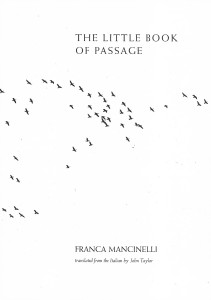Five poems from Franca Mancinelli’s « Mala kruna » in « Enchanting Verses »
- Post By: johntaylor
- Date:
- Category: News
Five poems by Franca Mancinelli, in John Taylor’s translation, have been published in The Enchanting Verses Review. The poems, from her first book, Mala kruna (2007), are accompanied by an interview with Anindita Bose. Here is a question about the translation of Libretto di transito (Amos Edizioni) / The Little Book of Passage (The Bitter Oleander Press).
4. Your poems have been translated into English. Western theories on translation stress on fidelity with semantics or meaning but Indian theory concentrates on conveying the emotional effects and impact. What is your opinion on translation of poems especially relating to your poems?
F.M.: My poetry is very dense, usually concentrating in few verses a lot of meaning and possibilities of meaning, such as a “Mother dough” that needs time to rise. Above all, my poetry needs the attention and care of the Other. The reader needs to carry out a task, to give that dough a shape, the one closest to his own listening, to his experience. A translator to another language is a special reader of a poem, a reader with a big responsibility. His duty is to carry this deep possibility of meaning into another language, without explaining it, without killing all the lives moving inside the original language, but instead trying to save them—not to choose one single street but rather to leave the intersection open to readers.
A translator, more than any critic, can be the best reader of a poem. That is what I realized while I was working with John Taylor, the American translator of my third book, The Little Book of Passage. It’s a book of prose poems or, perhaps, a book of verse poems without line breaks. Silence and what remains unwritten are as important as the few sentences actually written down. As in my previous book, Mother Dough, I leave some pages entirely blank, as a space that marks the rhythm of the book, a rhythm of wakefulness and sleep, of vision and a return to the place where the images arise. Thanks to John’s close and attentive gaze, I was able to discover the meaning of some words that have gone through me. For example, thanks to him, I now know the full Italian meaning of “falda” (“water table”). This meaning reached me with a healing power. In fact, the imagery of a “water table,” a “fault line,” a “crack,” or a “gap” runs through the entire book. I struggled a lot against them, with all my energy, suffering from a kind of defeat and frustration for “not being able to repair” them, until I realized, thanks to John, that the “water table” is located inside the earth, that it’s not repairable, that from it comes water (life), and that we have just to accept and recognize it as a source of life, in whatever form life appears: as an ordered garden, or a chaotic ground. As in this text from The Little Book of Passage:
In the evening, a cigarette between his fingers, watching the sky darken like moistened soil, my father waters his garden. When he’s standing down there in the farthest corner, hidden by the tomato plants, I can hear the water pouring from the well, streaming down between the dirt clods to the roots awaiting it. Here, where the flow has trickled out, sprout plants with poisonous fruit, stiff stalks of grass with tiny flowers. I haven’t succeeded in hoeing them away, in repairing the water table.
Now, thanks to this awareness that the American translation has given to me, I can read the last sentence of this prose poem with another tone—free from pain. »

Laisser un commentaire